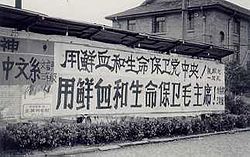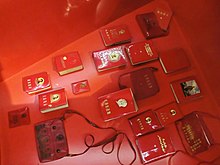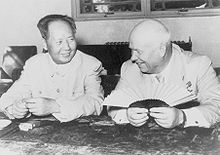Cultural Revolution
![]()
This article describes the Cultural Revolution in China. For that in Iran, see Cultural Revolution (Iran); for the magazine, see Cultural Revolution (magazine).
The Chinese Cultural Revolution (Chinese 無產階級文化大革命 / 无产阶级文化大革命, pinyin wúchǎnjiējí wénhuà dàgémìng, - "Great Proletarian Cultural Revolution" or 文革 wéngé for short) was a political campaign in the People's Republic of China launched in 1966 by Mao Zedong and his allies in the People's Republic of China. The campaign lasted until 1976 and is also known as the "Ten Years of Chaos" in China. Mao launched the Cultural Revolution with the help of the "Cultural Revolution Group" and others. These included his wife Jiang Qing, his private secretary Chen Boda, Defense Minister Lin Biao, radical cultural officials Zhang Chunqiao, Yao Wenyuan, and secret action specialist Kang Sheng. This period also saw the establishment of Mao's personality cult. With the ostensible goal of removing capitalist, bourgeois and traditionalist infiltrations of society by continuing the class struggle, the movement was accompanied by massive human rights violations and political assassinations up to the highest level; among others, Mao's respectively disgraced designated successors Liu Shaoqi and Lin Biao died.
An exact number of people killed by the Cultural Revolution is not known. Available estimates (some politically motivated) vary widely, ranging from hundreds of thousands to 20 million dead across China. Massacres such as the Guangxi Massacre (and cannibalism), the Inner Mongolia Purge, the Guangdong Massacre, the Zhao Jianmin Espionage Case, the Daoxian Massacre, the Shadian Incident, and the Red August of Beijing occurred during the Cultural Revolution. In addition, many millions of people were subjected to torture and other physical and psychological abuse, were arrested, and ended up in prisons and labor camps. An even larger number were exiled to remote areas of the country. Beginning with the Red August of Peking, the movement to destroy the "Four Old Men" was carried out. During the Cultural Revolution, the Banqiao Dam and other 61 dams in Henan Province collapsed in 1975, becoming one of the greatest technological disasters in history. While Mao declared the Cultural Revolution over in 1969 after fundamental (but ultimately not lasting) upheavals in society and government, its end is more commonly attributed to Lin's death in 1971 or Mao's death in 1976. In October 1976, the initiators of the Cultural Revolution, the "Gang of Four," were arrested, putting an end to the Cultural Revolution.
By successive Chinese governments, especially in Deng Xiaoping's assessment, the Cultural Revolution since 1981 has been regarded as a grave mistake and the biggest step backward in the country's history, but aside from the official account of 1981, it is hardly taken into account in the culture of remembrance. In the late 1970s, Deng Xiaoping launched the "Boluan Fanzheng" program to correct the mistakes of the Cultural Revolution and brought the country back to order. In December 1978, Deng became China's new supreme leader and launched the "Reform and Opening Up" that ushered in a new phase of China. But Mao's responsibility is considered rather minor and isolated from his other vaunted activities and cult of personality.

Slogans on the outer wall of Fudan University in the spring of 1976: "Blood and life in defense of the Central Committee, blood and life in defense of Mao".

Words of Chairman Mao Zedong in different Chinese languages
Development
Initially, the Cultural Revolution was welcomed by large segments of the population as a movement to redress grievances in the state and society. Mao, however, instead of the renewal within the Chinese Communist Party (CCP) desired by politicians such as Liu Shaoqi, set in motion a mass movement to destroy the old CCP. Most of the old cadres were removed from their posts. Only 28% of Politburo members, 34% of CC members, and 29% of provincial secretaries managed to hold on to their positions by the end of 1966.
The Cultural Revolution consisted of a series of mass campaigns that alternated and sometimes contradicted each other. Originally, the Cultural Revolution was supposed to last only half a year, then it was prolonged for ten years, until Mao's death. If Mao was still able to inspire substantial parts of the population for the Cultural Revolution at the beginning, the mass movements ordered in the last years became listlessly held compulsory rituals.
The Cultural Revolution is often divided into three phases: the Red Guard period (May 1966 to 1968), the Lin Biao period (1968 to August 1971), and the Zhou Enlai period (August 1971 to October 1976).
Unlike the Great Leap Forward campaign, the economy and agriculture were largely exempted from the Cultural Revolution. It had been learned that production had to continue as undisturbed as possible. The campaigns focused on politics, culture, public opinion, schools and universities, but there the Cultural Revolution initially raged with sometimes boundless cruelty. Several professors were beaten to death. The universities stopped their work at the beginning of the Cultural Revolution, and normal university operations, with entrance and final examinations and qualified certificates, were not reintroduced until 1978. Numerous cultural monuments were destroyed by revolutionaries.
Among the leading politicians, too, there was this division of labor between the Cultural Revolution and production. Under Mao's guidance, politicians like Jiang Qing and Lin Biao were responsible for the Cultural Revolution; politicians like Zhou Enlai and Deng Xiaoping were responsible for the economy, which Mao knew little about and left to others.
Concept and term
By the 1960s, in Mao's view, China, like the USSR before it, was on the road to revisionism. In the USSR, in Mao's view, a new bureaucratic class had taken power, aloof from the mass of the population. Mao pointed out that class struggles must be the guiding principle of politics and that the class struggle must be carried out "daily, monthly and annually." In China, however, Mao saw a solidification in the achieved state with a bureaucrat class that cemented its position, aloof from the masses of the people.
Therefore, Mao called for a new socialist revolution in the field of political, social as well as cultural superstructure - the Cultural Revolution. The reason for the proclamation of the Cultural Revolution was not only the overthrow of some politicians of the "pragmatic line" such as Liu Shaoqi or Deng Xiaoping. Their ousting was already done at the beginning of the Cultural Revolution in May 1966, when a large majority in the new Politburo turned against them. They were able to continue in economic and day-to-day politics, but they had lost the backing of the Politburo. Mao had a larger social goal in mind. The whole of society and the party were to be proletarianly renewed, and a further step towards ideal socialism was to be accomplished.
Unlike the politicians around Liu Shaoqi, Mao was concerned that the necessary renewals would be brought about not within and by the Communist Party, but by the masses. He believed that by relying on the onslaught of the popular masses, a change in the overall social situation could be brought about and thus a true socialist society could be created. Hence Mao's expression: "With chaos on earth one achieves great order in the country".
Mao hoped to become the father and leader of the world socialist revolution through the Cultural Revolution and therefore regarded the Cultural Revolution as a decisive event in human history. In 1967 he wrote in the magazine Rote Fahne:
"The Great Proletarian Cultural Revolution is a revolution that has seized the souls of the people. It strikes at the fundamental position of the people, determines their world outlook, determines the path they have already taken or will take, and grips the entire revolutionary history of China. This is the greatest upheaval of society unprecedented in human history. It will raise a whole generation of staunch Communists."
Combined with the daily personality cult around Mao, Mao's proclamation to the Chinese youth to open a new chapter in the history of mankind towards an ideal world with the Cultural Revolution gave the movement enthusiasm, fanaticism as well as brutality, hatred and destructiveness against the alleged enemies.
An essential feature of the Cultural Revolution was its indeterminacy. The aim was to expose "capitalist rulers" and "revisionists" who were taking the "wrong road," but nowhere was it specified what these terms meant. At the same time, the sentences passed were absolute. In the case of a person accused of being on the wrong path, everything was wrong; in the case of persons who were "on the right path," everything was right. From this also often followed senseless brutality against old, deserving comrades and fighters in the Civil War who had allegedly "left the right path." Even between the drivers of the Cultural Revolution, violent conflicts were not uncommon.
Cultural life and higher education came to an almost complete standstill. Universities did not hold normal educational sessions from 1966 to 1978. Avoiding the emergence of a new educational class and propagating the class struggle appeared more important than imparting knowledge.
The exclusion of the economy from the Cultural Revolution made it possible for Deng Xiaoping, who had been attacked as a particularly nasty "revisionist" during the Cultural Revolution, to be politically active in a leading position for five years out of the ten years of the Cultural Revolution, from 1966 to 1968 as general secretary of the party and from 1973 to 1976 as deputy and later successor to Zhou Enlai. On the other hand, the grip in the field of culture was extensive. Jiang Qing, for example, arbitrarily selected works in which proletarian heroes and their exploits were presented as exemplary. The performance of traditional operas was banned.
Shortly before his death Mao received once more his successor HuaGuofeng and his most important comrades-in-arms for the Cultural Revolution, the later Gang of Four Wang Hongwen, Zhang Chunqiao, Jiang Qing and Yao Wenyuan, and gave the following verdict on his life's work:
"In China there is an old saying: Only when the coffin is closed can a judgement be made about it. It's about time for me too, now you can make an assessment after all. In my life, I can look back on two achievements. I fought Chiang Kai-shek for decades and drove him out to some islands. After an eight-year war, I sent the Japanese home. Finally, I advanced to Peking, all the way to the Forbidden City. [...] As you know, the other achievement is the Cultural Revolution. Few support it, many are against it."
Four weeks after Mao's death, Wang Hongwen, Zhang Chunqiao, Jiang Qing, and Yao Wenyuan were arrested as a gang of four, and a year after Mao's death, Deng Xiaoping was reinstated to his former posts. The Cultural Revolution, for which Mao had fought for ten years, was over.

Mao and Khrushchev (1958)
Questions and Answers
Q: What was the Great Proletarian Cultural Revolution?
A: The Great Proletarian Cultural Revolution was a time of large cultural change in China, started by Mao Zedong, Chairman of the Communist Party of China. It happened from 1966 to 1976.
Q: What preceded the start of the Cultural Revolution?
A: The start of the Cultural Revolution followed the failure of the Great Leap Forward.
Q: What did Mao do to remove capitalists from the Communist Party?
A: To get rid of the capitalists, he started the Socialist Education Movement which started in 1962 and ended in 1965.
Q: Who supported Mao during this period?
A: Mao was supported by Lin Biao, Jiang Qing, and Chen Boda during this period.
Q: What book did Mao create to gain support from young people?
A: To gain support from young people in China, Mao created Quotations from Chairman Mao Zedong (also known as the Little Red Book), a collection of his sayings.
Q: Who were members of The Red Guard?
A: The Red Guard was a group of young people in China that went around teaching Mao's sayings and also beat people who disagreed with him and destroyed homes and museums.
Q: Who were forced to leave during this revolution?
A: During this revolution several important people in China were forced to leave including Liu Shaoqi, President of China, and Deng Xiaoping, secretary-general of the Communist Party of China.
Search within the encyclopedia